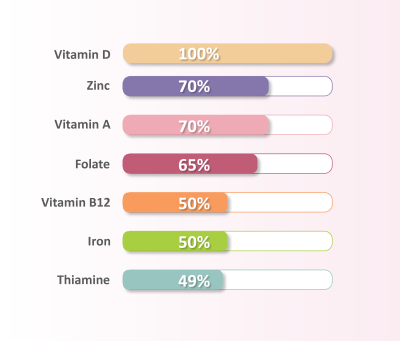Which nutritional deficiencies are common after bariatric surgery?
Which deficiencies?
Observational studies* show that major deficiencies have been reported in: Vitamin D, Zinc, Vitamin A, Folate, Vitamin B12, Thiamine, and Iron.
Calcium, vitamin B12, folic acid (vitamin B9), vitamin B1, copper, zinc, iron and fat-soluble vitamins D, A and E deficiencies are the most common. Depending on your blood values, it may be necessary to, beside a multivitamin/mineral preparation and calcium preparation, replenish the deficiencies with an extra iron or vitamin B12 supplement.
Remember, standard supplements are not sufficient after bariatric surgery, they are too low in dosage and are not well absorbed. Therefore, always opt for specific bariatric supplements to stay in shape.
How to recognize shortages?
Vitamin and mineral deficiencies most often develop gradually. In the beginning, the symptoms may be rather vague, but after a while, they will be ever more noticeable. Vitamin and mineral deficiencies must regularly be traced via blood analysis. Talk about your surgery with your general practitioner. Make sure you regularly have your blood checked in the center where you had your surgery done or with your general practitioner (the 1st year every 3 months, the 2nd year every 6 months and then every year).
Consequences of deficiencies?
General vitamin and mineral deficiency
Deficiency of minerals (such as zinc, magnesium, iron, copper, calcium, … ) and vitamins (such as vitamin A, B1, B6, B9, B12, C, D, E, …) deficiency leads to reduced health. Typical complaints are fatigue, trouble concentrating, insomnia, listlessness, muscle cramps, hair loss, …
General calcium deficiency
Calcium is important for bone formation and for the maintenance of strong bones. In case of long-term calcium deficiency, the body will extract calcium from the bones. This may lead to osteoporosis or bone decalcification and/or bone fractures. You may also suffer from confusion, forgetfulness, muscle cramps, muscle weakness, …
Specific vitamin B12 deficiency
Vitamin B12, a water-soluble vitamin, is important for the production of red blood cells and for a normal functioning of the nerves and brains. Vitamin B12 has to bind to the “Intrinsic Factor” for absorption into the body. The “Intrinsic Factor” is produced in the stomach. When part of the stomach has been removed, little to no intrinsic factor can be produced. Vitamin B12 deficiencies are thus inevitable. Lasting vitamin B12 deficiencies may lead to anemia through a decrease of the number of red blood cells, but also to neurological problems such as muscle weakness, confusion, forgetfulness, increased irritability, …
Specific iron deficiency
Iron is an important mineral that supports the production of red blood cells and helps to fight fatigue. An iron deficiency will be noticeable quite quickly: lack of energy, fatigue, headache, dizziness, concentration problems… A clear iron deficiency may reduce your immunity, leading to increased risk of diseases.
Specific vitamin D deficiency
Vitamin D is a fat soluble vitamin, obtained partly from sun exposure (UV light), through the skin, and partly from food. Vitamin D ensures a good immunity and strong bones and teeth by helping with the absorption of calcium and phosphorus from nutrition. In case of a lack of sun exposure and/or a low dietary intake, vitamin D deficiency may occur. Moreover, vitamin D deficiencies are very common among people who have undergone bariatric surgery. That is because vitamin D is stored mainly in the fat mass, as a result of which these people run a great risk of having a vitamin D deficiency already before bariatric surgery. A lasting vitamin D deficiency may lead to several disorders.
Don’t forget the proteins
Proteins are the building blocks of our bodies (bones) and help maintain muscle mass. In case of a lack of proteins, muscle atrophy may occur. After bariatric surgery, it may be difficult to take the daily recommended amount of proteins through nutrition. Supplementation may be recommended to help achieve this goal.








